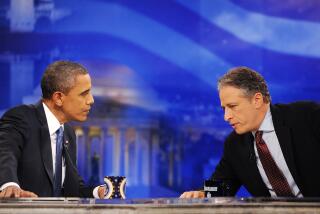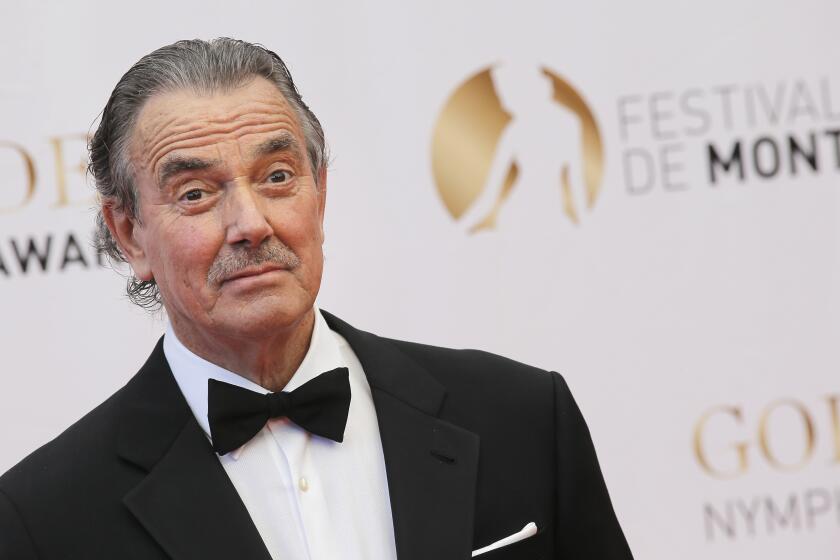Review: On ‘The Late Late Show,’ Craig Ferguson became best host on TV
Craig Ferguson, the host for 10 years of CBS’ “The Late Late Show,” taped his last episode Thursday, a day before it was set to air — by which time, he pointed out, he would already be back in Scotland, where he’s from. I almost wrote “back home in Scotland,” but Ferguson is an American citizen now, with American-born kids and Benjamin Franklin’s “Join, or Die” snake cartoon tattooed on his forearm. He’s home when he’s here.
I watched the show’s finale happen with a handful of other writers via closed-circuit TV from a room elsewhere in the studio. Ten months earlier, I did something of the same at NBC for Jay Leno’s last “Tonight Show.” Leno, as it happened — or was made to happen — was Ferguson’s final guest in a week whose visitors also included another talk-show host no longer on conventional television, Larry King.
It was the same day, coincidentally, that Stephen Colbert, with somewhat more hoopla, closed down Comedy Central’s “The Colbert Report” to take over CBS’ “Late Show” from David Letterman — a job that, in what many assume to be the rules of late-night succession, would ordinarily have been offered to Ferguson.
Some have seen this as the reason behind Ferguson’s resignation — which is not, as he has repeatedly said, his retirement.
“I’m stopping doing this, I’m not stopping doing it,” he told his last “Late Late Show” audience, going on, with an air of sauciness, “I might do it a little bit earlier. I might do it in a different place.”
And what I know of him — from watching his show over the last decade, reading his books, spending an hour talking to him four years ago and a recent interview he gave to King, a man to whom he would not lie — argues against this being an act of pique or spite.
He had been looking forward to the finale, in the weeks before, with excited anticipation, even glee, as one watches a fuse burn toward a firecracker.
His final show began with a performance of “Bang Your Drum,” by Dead Man Fall, a band from Ferguson’s hometown of Cumbernauld, taken up in the studio by the very occasional semi-house band Bone Patrol. Ferguson is an old punk-rock drummer, but here the host stood atop his desk and sang the verse, “No one lives forever/There’s business here you’ve got to finish.”
Famous faces joined in by video, including Jack Black, Henry Winkler, William Shatner, Lisa Kudrow, Ray Romano, Julia Louis-Dreyfus, Regis Philbin, Betty White, Tim Meadows, Jane Lynch, Samuel L. Jackson and Jon Hamm, plus Ferguson’s bunny and alligator puppets. There was a gospel choir, and dancing from Secretariat, the fake horse. Robot skeleton sidekick Geoff Peterson (controlled and voiced by Josh Robert Thompson), whose introduction in 2010 changed “The Late Late Show” from what was substantially a one-man show into an antic double act, waved along.
Ferguson was not the best known of the late-night hosts, but he was the most singular and, for my money, the best, for his storytelling, curiosity, physicality and attraction to risk. In his “Late Late Show,” at once serious and childlike, it mattered that something real was taking place — a commitment to the moment, whether a connection between host and guest or just a willingness to play, to play along.
This made the show feel intimate even when nothing intimate was being shared, and exciting even when it fell on its face. The space Ferguson created was elastic, with regular features but no real routine — anything could happen if it felt right. It had a moral not a moralizing quality, as when the host defended Britney Spears at the nadir of her public meltdown, and could accommodate a range of complicated tones, from utter foolishness to heartbroken eulogy.
What it was never about was the promotional cycle that shapes most such shows. “The Late Late Show” was in that game, one might say, but not of it. Ferguson, until the end, would ritually begin an interview by showily tearing up his note cards.
“The best guests tend to be those who are generous of spirit because that’s the spirit of the show,” Ferguson said when I interviewed him in 2010. “Bring something to it ‘cause I ain’t gonna ask you what practical jokes you played on a movie set ‘cause I don’t care. And I’m not going to ask anything that doesn’t interest me, because that’s not my job.”
On his last night, Ferguson took a look back: “You came to a show that was, let’s be honest, a bit of a fixer-upper, and it kind of stayed that way. ‘Art’ is a very grand word, but what I think I was trying to do here, and think we managed to do here, is make something that wasn’t here before. In that sense, maybe it is a piece of art.” Then he and Peterson randomly created a “new character” from his prop pipe, Pipey McPiperson, who sounded a bit like Ferguson.
He introduced Leno as an “American treasure.” Leno, relatively relaxed, thanked Ferguson for not joining the dog pile when he and Conan O’Brien were in their strange dance over stewardship of “The Tonight Show.”
They were now just “two guys with nothing to do.” They talked about each other’s hair. (Ferguson to Leno: “Have you grown sideburns? You look very poetic.” Leno to Ferguson: “You’ve got a Chris Isaak thing going there.” Ferguson: “More Mohawk, less anchorman.”) They discussed the perceptual perils of interviewing women a fraction of their age, cussing, their Scottish mothers.
Leno remembered his mother telling him, “Whatever you do, never make yourself the center of attention.”
“Twelve-thirty at CBS,” Ferguson noted, “is not the center of attention.”
Twitter: @LATimesTVLloyd
More to Read
The complete guide to home viewing
Get Screen Gab for everything about the TV shows and streaming movies everyone’s talking about.
You may occasionally receive promotional content from the Los Angeles Times.







